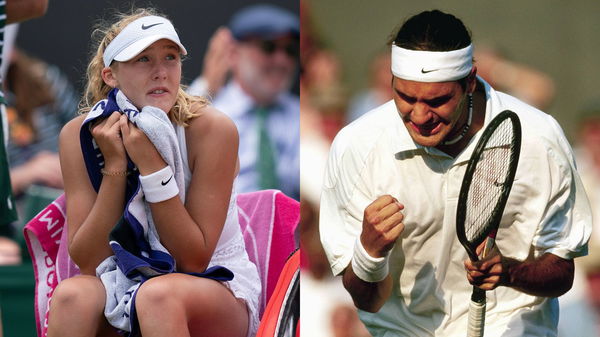
via Imago
Image credits – Imago

via Imago
Image credits – Imago
The world of tennis presents a unique blend of incredible opportunities and immense pressure. Rising stars find themselves catapulted into the limelight, where the weight of expectations can be both inspiring and overwhelming. Mirra Andreeva, a remarkable 16-year-old player from Russia, has captured the hearts of fans at this year’s Wimbledon.
However, even at her tender age, she has already encountered a test of emotional control. In her last match against Madison Keys, Andreeva’s unintentional racket slide led to a misunderstanding and a subsequent clash with the chair umpire at Wimbledon. Amidst the controversy, she drew strength from the experiences of tennis legend Roger Federer, recognizing that the journey to emotional maturity requires self-work.
ADVERTISEMENT
Article continues below this ad
Why did Mirra Andreeva lose her cool at Wimbledon?
During her match against Madison Keys, Mirra Andreeva faced a critical moment where her emotions got the better of her. In what appeared to be an accidental racket slide, the umpire, Louise Azemar Engzell, mistakenly believed she had thrown her racket. He gave her a point penalty for unsportsmanlike conduct. Andreeva’s frustration was evident, leading to a heated exchange between her and the umpire.
?Do you understand what you are doing? I didn?t throw the racket. I slid. It?s the wrong decision. I slid and then I fell,? said Andreeva, pointing out the umpire for giving her a warning.
"Codeviolation, unsportsmanlike conduct, point penalty, Mirra Andreeva."
Agree or disagree with the umpire's decision at 5-2 deuce 🤔#Wimbledon pic.twitter.com/7BuoZQ9wbP
— Tennis Channel (@TennisChannel) July 10, 2023
Despite arguing her case vehemently, she received a warning and opted not to shake hands with Azemar Engzell, remaining firm in her disagreement. Recalling the incident in her post-match press conference, Andreeva gave the example of the early years of the Swiss Maestro.
Andreeva reflects on Roger Federer’s early years on the ATP Tour
Mirra Andreeva’s journey toward emotional control took inspiration from the struggles of tennis icon Roger Federer during his own teenage years. In an interview, Andreeva candidly expressed her admiration for Federer’s ability to overcome emotional hurdles. She acknowledged that witnessing his struggles made her realize that she was not alone in her own challenges.
?I knew that Federer was struggling with emotions when he was a teenager,? she said. ?Actually when I was younger, I saw that, ?Well, he was struggling also. I?m not the only one who also struggles?.
ADVERTISEMENT
Article continues below this ad
?I thought that I just need to wait a little bit and it will go away. But it doesn?t work like this. You just have to work on yourself. The faster you?ll do it, then the results will come also faster, I think. I started to work on myself just with myself. I think it works pretty good now,? said Andreeva.

via Imago
Image credits – Imago
Believing that time alone would heal her emotional tendencies, Andreeva soon discovered that personal growth required proactive effort. Drawing upon her own experiences, she recognized the necessity of working on herself to achieve faster progress. Andreeva’s determination to develop emotional maturity serves as a testament to the transformative power of self-reflection and growth. Still, at a young age, she has the world to conquer at her feet, with the support of her family.
ADVERTISEMENT
Article continues below this ad
Mirra Andreeva’s tennis journey has already encountered a significant test of emotional control, highlighting the responsibilities and challenges that come with rising stardom. Can Andreeva forge a successful tennis career like her idol Roger Federer?
Watch this story: Years After Her Dispiriting Beyonce Memory, 20-Year-Old Coco Gauff Finally Gets Her Fangirl Moment With the American Nightingale in Paris
ADVERTISEMENT
ADVERTISEMENT
ADVERTISEMENT
ADVERTISEMENT

